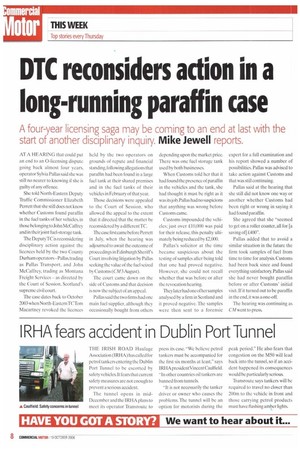DTC reconsiders adion in a
Page 8

If you've noticed an error in this article please click here to report it so we can fix it.
long-running paraffin case
A four-year licensing saga may be coming to an end at last with the
start of another disciplinary inquiry. Mike Jewell reports.
AT A HEARING that could put an end to an 0-licensing dispute going back almost four years, operator Sylvia Pallas said she was still no nearer to knowing if she is guilty of any offence.
She told North-Eastern Deputy Traffic Commissioner Elizabeth Perrett that she still does not know whether Customs found paraffin in the fuel tanks of her vehicles, in those belonging to John McCaffrey and in their joint fuel-storage tank.
The DeputyTC is reconsidering disciplinary action against the licences held by the two County Durham operators— Pallas, trading as Pallas Transport, and John McCaffrey, trading as Montana Freight Services — as directed by the Court of Session, Scotland's supreme civil court. The case dates back to October 2003 when North-Eastern TCTom Macartney revoked the licences
held by the two operators on grounds of repute and financial standing, following allegations that paraffin had been found in a large fuel tank at their shared premises and in the fuel tanks of their vehicles in February of that year.
Those decisions were appealed to the Court of Session, who allowed the appeal to the extent that it directed that the matter he reconsidered by a differentTC.
The case first came before Perrett in July, when the hearing was adjourned to await the outcome of proceedings in Edinburgh Sheriff's Court involving litigation by Pallas seeking the value of the fuel seized by Customs (CM 3 August).
The court came down on the side of Customs and that decision is now the subject of an appeal. Pallas said the two firms had one main fuel supplier, although they occasionally bought from others
depending upon the market price. There was one fuel storage tank used by both businesses.
When Customs told her that it had found the presence of paraffin in the vehicles and the tank, she had thought it must be right as it was its job. Pallas had no suspicions that anything was wrong before Customs came.
Customs impounded the vehicles: just over £10,000 was paid for their release, this penalty ultimately being reduced by £2,000.
Pallas's solicitor at the time became suspicious about the testing of samples after being told that one had proved negative. However, she could not recall whether that was before or after the revocation hearing. They later hadone of hersamples analysed by a firm in Scotland and it proved negative. The samples were then sent to a forensic
expert for a full examination and his report showed a number of possibilities. Pallas was advised to take action against Customs and that was still continuing.
Pallas said at the hearing that she still did not know one way or another whether Customs had been right or wrong in saying it had found paraffin.
She agreed that she "seemed to get on a roller coaster, all for [a saving of] MO".
Pallas added that to avoid a similar situation in the future the firm took samples of fuel from time to time for analysis. Customs had been back since and found everything satisfactory. Pallas said she had never bought paraffin before or after Customs' initial visit. If it turned out to be paraffin in the end, it was a one-off.
The hearing was continuing as CM went to press.


























































































































































































